David Suzuki's Blog, page 20
December 12, 2016
Foundation fellowships to help scholars seek solutions
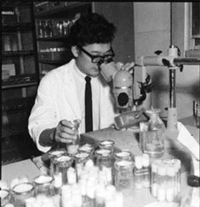
My academic career was helped a lot by scholarships and mentors. When I was accepted into Amherst College in Massachusetts in the 1950s, a healthy scholarship made attending possible. I did an honours degree in biology and was inspired by Prof. Bill Hexter to go into genetics after graduating. I went to the University of Chicago, where I studied and worked as a research assistant to fruit fly geneticist Bill Baker and then received a large scholarship that helped me finish my PhD in three years. In 1961, I worked as a research associate at the Oak Ridge National Laboratory's biology division under Dan Lindsley, one of the world's leading experts in chromosome manipulation.
I understand the value of that kind of help and encouragement for students and academics who want to put their education to good use. That's why the David Suzuki Foundation has embarked on a fellowship program for emerging scholars.
Under the program, the Foundation will foster leadership, provide mentors and reduce financial barriers so fellows can work on solving complex environmental challenges. Fellows will learn communication and public engagement strategies so they can share their research findings and inspire all of you who are part of the Foundation's community.
Thanks to generous donors, the Foundation is offering annual fellowships of $50,000 plus $5,000 for travel and other professional expenses, as well as access to office space and computers. The first three fellows will work in the Foundation's Vancouver, Montreal and Toronto offices on climate change solutions related to transportation, clean energy and Indigenous knowledge. Under the guidance of Foundation staff and mentors, each will be required to complete a one-year research project as well as contribute to Foundation work and initiatives.
The fellowships are open to Canadian citizens or people with work visas, with a master's degree or PhD, or in the final year of a PhD.
I'm extremely grateful to all who helped me academically and financially during my studies. I learned about science and how to communicate complex ideas, and that has led to a fulfilling career and a way to make positive contributions to Canada and the world. I hope we can do the same for some of today's bright students and academics who want to put their ever-growing knowledge to resolving some of the environmental crises we face.
If you'd like to apply for a fellowship, or know anyone who would make a good candidate, please visit fellowships.davidsuzuki.org/findingso.... The application deadline is February 1, 2017.
Hey! Want more DSF? Join David Suzuki on Facebook

Bloor bike lanes are a success!

(Credit: Kevan/Flickr)
Driving in Toronto is a drag! Delays on highways and roads are a daily occurrence. Collisions are, too -- an average of 55,000 in the city each year! Costs for car payments, insurance, parking and repairs are a heavy burden.
Compare this to the healthy, affordable and even joyful activity of riding a bicycle. Bike lanes help to order all traffic and make roads safer for everyone. They make cycling activity predictable, setting out exactly where cars and bikes are supposed to be.
Your support helped push the City of Toronto to develop a bike lane on the critical Bloor Street artery as a pilot project this summer. And the results are in: Bells on Bloor volunteers found bicycles were 43 per cent of the total traffic in a one-hour period. And bicycle traffic was up 75 per cent from last year, when there were no bike lanes.
Thanks to you, Toronto travellers have healthier and more sustainable options!
Hey! Want more DSF? Join David Suzuki on Facebook

Simple "green" cleaning substitutes for borax
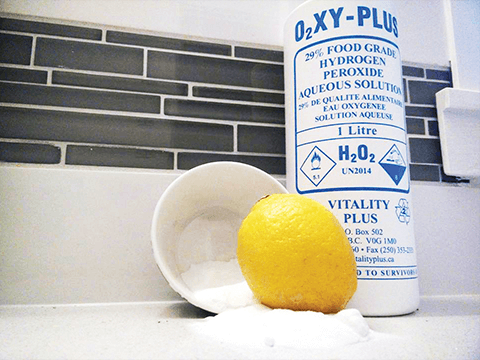
It's time to ditch borax -- a salt of boric acid -- as a "green" home-cleaning ingredient.
Six reasons to go borax-free:
1. You want your home to be pesticide-free (borax kills ants).
2. You can clean well with food-grade ingredients only -- baking soda, salt, vinegar and hydrogen peroxide (treat stains, too).
3. You can use borax-free "green" cleaning recipes.
4. You won't risk poisoning your child or pet.
5. You can clean risk-free while pregnant.
6. Your kids can help make the cleaners and do the cleaning!
SIMPLE SUBSTITUTES FOR BORAX
To disinfect: Add food-grade hydrogen peroxide (three per cent) to a spray bottle. Spray on hard surfaces and wipe clean. Optional: Add a few drops of lemon, lime, orange, grapefruit, tea tree, lemon grass, thyme, lavender, rosemary and/or eucalyptus essential oil, which have antibacterial, antifungal and grease-cutting properties.
To whiten: Try oxygen bleach, in liquid or powdered forms. Follow product instructions. Safe for cloth diapers!
To fight mould and mildew: Clean with salt or use diluted white vinegar (50:50) carefully on tub and tile.
The safety of borax (its salts and precursors) has been
under review:
The U.S. Environmental Protection Agency called boric acid an irritant and hormone disruptor based on toxicity tests on rats, mice and dogs. Health Canada's science-based screening assessment recommends minimizing exposure.
The Environmental Working Group does not recommend using borax to clean your home because it's a short-term irritant and hormone disruptor.
The European Union reported developmental and reproductive toxicity effects in laboratory animals. (No clear evidence of male reproductive effects in studies of highly exposed workers in boron mines. But a possible risk of harm to unborn children.)
Finish off your last box of borax. Sign up for monthly digests with recipes, assessments and/or cleaning substitutes at queenofgreen.ca/solutions
Hey! Want more DSF? Join David Suzuki on Facebook

Camp Suzuki plugs kids into nature
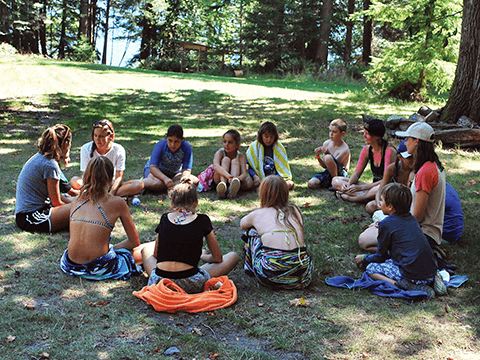
Thanks to you, Camp Suzuki 2 was a resounding success!
The camp, located on Gambier Island in the heart of B.C.'s spectacular Howe Sound, aims to inspire the next generation of environmental leaders. Participants spent time outdoors learning about nature and how to protect it for future generations.
This year, Camp Suzuki ran for two weeks. Week one repeated last year's model, hosting 42 young adults. Week two was a first-time effort, tailored to 40 children age seven to 13.
This year, a youth group from Toronto joined our young adult program. That week, DSF staffers led sessions describing their journeys into environmentalism and conservation leadership.
In the second week, members of the Squamish First Nation taught the youngest campers about how to respect and care for the land and waters we share.
All left feeling inspired -- ready to keep Howe Sound's amazing recovery going!
Hey! Want more DSF? Join David Suzuki on Facebook

Half measures aren't enough to save caribou

(Credit: Nathan Debryun/Flickr)
Alberta is home to two of Canada's imperilled caribou populations, the southern mountain and boreal woodland herds. Both are threatened with extinction.
Alberta recently released its draft range plan for the Little Smoky boreal and A la Peche southern mountain herds. It allows for continued forestry and petroleum approvals in both ranges. The plan's troubling components could set a terrible national precedent.
Your support meant more than 4,000 people were able to send messages to Alberta Premier Rachel Notley and Environment Minister Shannon Phillips. Among other things, they asked the Alberta decision-makers to stop allowing new oil and natural gas leases and to restrict forest harvesting within caribou ranges. Thank you for helping make this possible.
Hey! Want more DSF? Join David Suzuki on Facebook

Protecting orcas

(Credit: Mike Charest/Flickr)
Few experiences are as exciting and awe-inspiring as seeing orcas off B.C.'s coast. But these endangered whales will only survive if we protect them. The government's proposed Killer Whale Action Plan was more than three years late. And it doesn't contain anything that will help whales right away.
Canadians care about protecting orcas. Thanks to your support, nearly 9,000 people were able to send messages to the federal government. They demanded immediate action to address the threats to orcas' food. They also called for increased enforcement and education, and a ban on toxins in orca habitat. Now we're waiting for a final, stronger action plan.
Hey! Want more DSF? Join David Suzuki on Facebook

Canada's oceans need support

(Credit: Davide D'Amico/Flickr)
Oceans support healthy coastal communities, people and economies. Canadians want and expect them to be clean, thriving and resilient. Over the past decade, we've seen dramatic reductions in protection of Canada's coasts.
Your support helped put these issues on the prime minister's desk. More than 14,000 Canadians signed a petition calling on Justin Trudeau and members of his cabinet to protect 10 per cent of Canada's oceans by 2020 -- to safeguard wild salmon, ban tankers on B.C.'s north coast and restore habitat protections cut by the previous government.
Hey! Want more DSF? Join David Suzuki on Facebook

Putting an end to coal in Canada

(Credit: David J and Pembina Institute/Flickr)
Why, in this high-tech world, are we still using an 18thcentury energy technology?
Coal is the dirtiest fossil fuel. It contributes to climate change, poor air quality, many illnesses -- including
asthma -- and rising health-care costs.
Your support launched a campaign to eliminate all Canadian coal power
plants over the next 10 years. Some 20,000 people used our web platform to "say no to coal," asking federal
decision-makers to commit to phasing out coal with this fall's climate strategy.
Thanks to you, our campaigners met with federal Environment and Climate Change Minister Catherine McKenna and others in her department. They encouraged the government to replace coal with renewable energy.
Sources inside the federal government tell us this pressure is working! We're keeping our fingers crossed for an announcement this month that Canada will finally put an end to this dirty fuel. (In fact, by the time you read this, an announcement might already have been made.)
Thank you for pushing for an end to the coal era in Canada!
Hey! Want more DSF? Join David Suzuki on Facebook

We're nearer to nationwide environmental rights, thanks to you
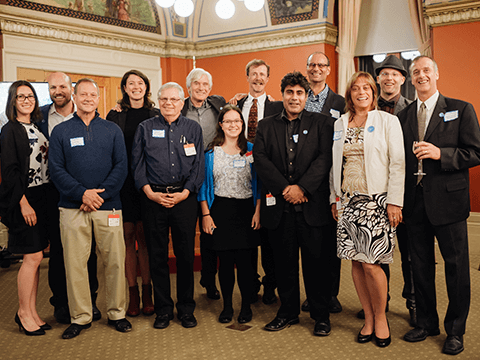
(Credit: Ben Welland, Byfield-Pitman Photography)
Ontario is updating its incomplete Environmental Bill of Rights. And, with your support, Blue Dot made the most of this once-in-a-generation opportunity:
Volunteers met with members of provincial parliament from across the political spectrum.
They organized local events, using cutting-edge digital tools to increase their reach.
More than 45 members of Ontario's provincial parliament attended the Parliament Hill reception we co-hosted with Ecojustice.
Some 400 grassroots volunteers drummed up interest in every region of the province.
More than 12,000 people wrote Ontario Environment and Climate Change Minister Glen Murray via our website.
Ontarians are learning that they have the right to know about pollution but no legal right that protects them from it. Some find that shocking. But they're hopeful.
Last year, your support helped 50 Ontario communities pass municipal environmental rights declarations. Those include Toronto, Ottawa, Hamilton, Mississauga and Kitchener, and represent some 7.8 million Canadians!
FIRST ONTARIO. THEN THE REST OF CANADA!
Canadian decision-makers are learning that the Blue Dot movement is a force of nature.
With your help, we're working for every Canadian's right to clean air, safe water, healthy food, abundant ecosystems and a say in the decisions that affect their health and well-being.
You make this powerful movement possible!
Hey! Want more DSF? Join David Suzuki on Facebook

Blue Dot ambassadors take on the nation
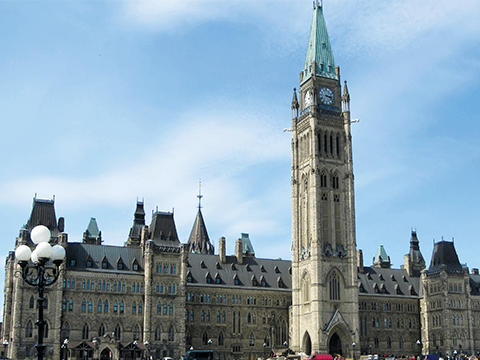
(Credit: Robert Linsdell/Flickr)
Two years ago, we set off together on an ambitious journey to achieve your constitutional right to a healthy environment. Thanks to your support, so much has been accomplished in such a short time!
More than 103,000 Canadians signed the Blue Dot pledge. A whopping 143 communities -- representing 40 per cent of the country's population! -- passed environmental declarations.
The time is ripe. The current political climate provides a window of opportunity to move forward to achieving a federal bill of rights. This is a necessary step toward our ultimate goal: recognizing your right to a healthy environment in Canada's Constitution.
BLUE DOT AMBASSADORS
In this next phase, your support means we can focus on helping members of Parliament understand why a national environmental bill of rights is important and how it can fulfill this government's green goals.
Thanks to you, we're recruiting grassroots volunteers as "constituent champions" -- Blue Dot ambassadors. They'll keep local MPs up-to-date on campaign developments. And they'll help them see how environmental rights benefit the citizens they represent.
Thank you! We're thrilled with what we've accomplished together over the past two years.
Hey! Want more DSF? Join David Suzuki on Facebook

David Suzuki's Blog
- David Suzuki's profile
- 247 followers



